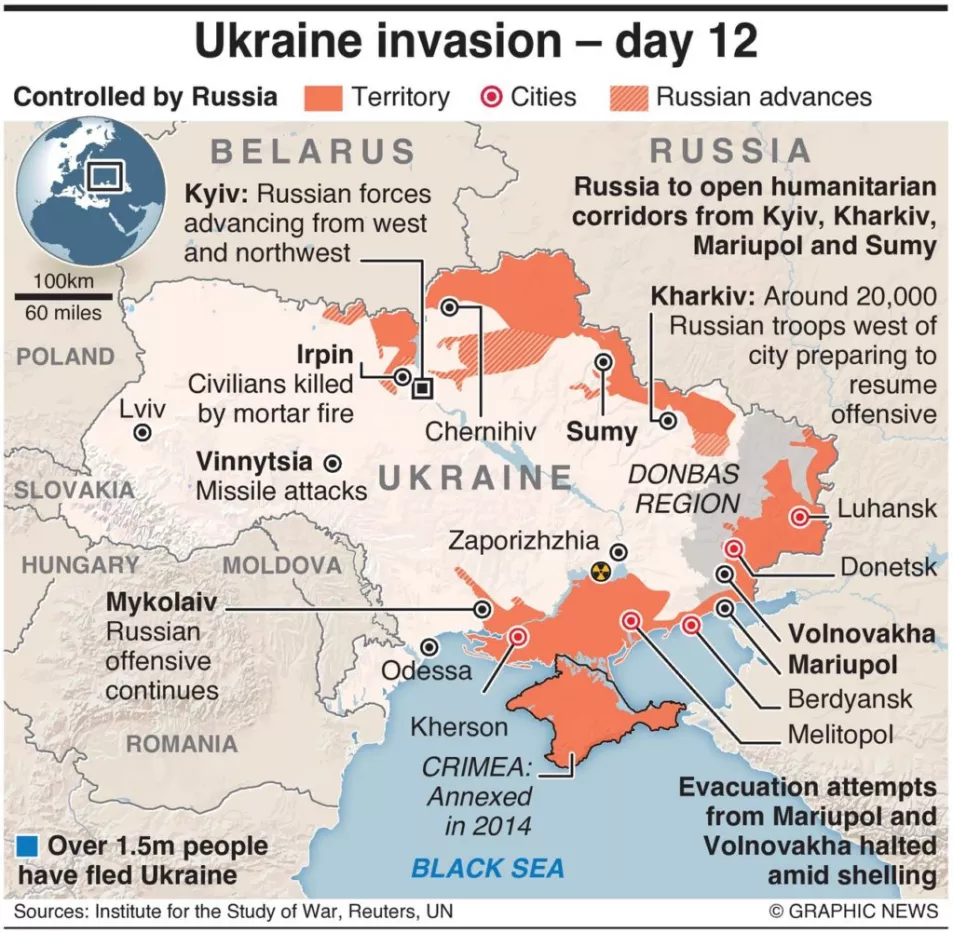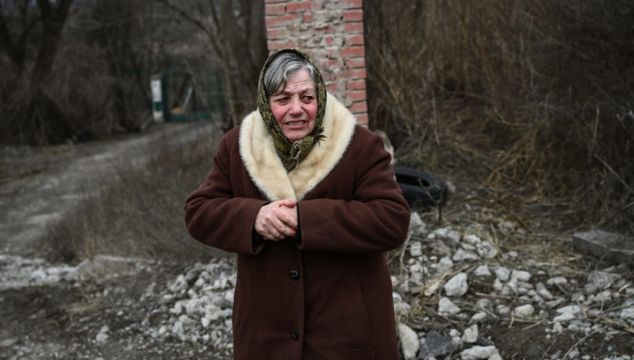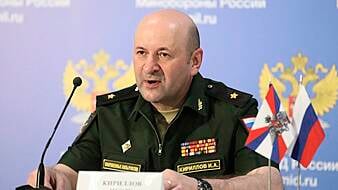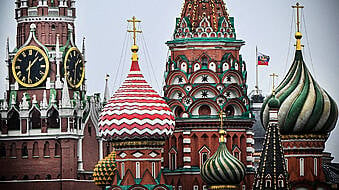What you need to know right now
- Russian President Vladimir Putin has now deployed into Ukraine nearly 100 per cent of the more than 150,000 forces that he had pre-staged outside the country before the invasion, a senior US defence official said.
- Moscow announced new "humanitarian corridors" to transport Ukrainians trapped under its bombardment to Russia and its ally Belarus - a move Kyiv dismissed as an immoral stunt and pleaded for more sanctions.
- Russia's defence ministry said it would open six humanitarian corridors in Kyiv and other Ukrainian cities, but Kyiv rejected the plan given the proposed evacuation routes led into Russian or Belarusian territory.
- A third round of talks about ending hostilities is due in Belarus on Monday, while Russia's and Ukraine's top diplomats are expected to meet in Turkey on March 10th.
- Oil prices hit 14-year highs after Washington said it was talking to European allies about banning imports of Russian oil.
- Top US diplomat Antony Blinken sought to reassure Baltic allies, fearing Vladimir Putin could go beyond his invasion of Ukraine in redrawing Russia's borders.
- While promising humanitarian aid to Ukraine, China's foreign minister hailed Beijing's friendship with Russia as "rock solid".
- As many as five million Ukrainians could flee the country if Russia's invasion continues, the EU's top diplomat said, while United Nations' refugee agency said over 1.7 million have left so far.
- Police detained 5,020 people at Russia-wide protests against the invasion of Ukraine, according to an independent monitoring group.
- Russia's rouble tumbled to another record low in thin offshore trade with local markets closed until at least Wednesday.
- Uniqlo owner Fast Retailing said it will keep its stores in Russia open as more global brands cut ties with Russia over its invasion of Ukraine.

9.50pm: Western countries could face oil prices of over $300 (€276.11) per barrel and the possible closure of the main Russia-Germany gas pipeline if governments follow through on threats to cut energy supplies from Russia, a senior minister said on Monday.
Oil prices spiked to their highest levels since 2008 on Monday after US Secretary of State Antony Blinken said Washington and European allies were considering banning Russian oil imports.
"It is absolutely clear that a rejection of Russian oil would lead to catastrophic consequences for the global market," Russian Deputy Prime Minister Alexander Novak said in a statement on state television. "The surge in prices would be unpredictable. It would be $300 per barrel if not more."
"European politicians need to honestly warn their citizens and consumers what to expect," he said. "If you want to reject energy supplies from Russia, go ahead. We are ready for it. We know where we could redirect the volumes to."
Novak said Russia, which supplies 40 per cent of Europe's gas, was fulfilling its obligations in full but that it would be entirely within its rights to retaliate against the European Union after Germany last month froze the certification of the Nord Stream 2 gas pipeline.
"In connection with... the imposition of a ban on Nord Stream 2, we have every right to take a matching decision and impose an embargo on gas pumping through the Nord Stream 1 gas pipeline," he said.
"So far we are not taking such a decision. But European politicians with their statements and accusations against Russia push us towards that."
9.30pm: Uniqlo owner Fast Retailing will keep its stores in Russia open, joining a small group of international firms that are staying put even as dozens of big brands temporarily shutter operations or exit the country over its invasion of Ukraine.
Many Western companies, from Nike Inc and home furnishings giant Ikea to energy majors BP and Shell, have closed shop or announced plans to exit the country.
The Big Four accounting firms KPMG, PwC, EY and Deloitte have moved one by one to cut their ties with Russia, as did credit card company American Express.
After Russian President Vladimir Putin signed a new media law on Friday, Chinese-owned video app TikTok said it would suspend live-streaming and the uploading of videos to its platform in Russia, while Netflix suspended its service there "given the situation on the ground".
8.15pm: Ukrainian Foreign Minister Dmytro Kuleba said Ukraine wanted direct talks between President Volodymyr Zelenskiy and Russia's Vladimir Putin because Kyiv knows Putin is the person calling the shots in Moscow.
"We have long wanted a direct conversation between the president of Ukraine and Vladimir Putin, because we all understand that it is he who makes the final decisions, especially now," he said in a live television broadcast.
"Our president is not scared of anything, including a direct meeting with Putin," Kuleba added. "If Putin is also not scared, let him come to the meeting, let them sit down and talk."
Russian aggression is different to all other wars of this century. The scale and the inhuman ideology behind it are reminiscent of WWII. Actions to counter it must be relevant. More severe sanctions on Russia; more weapons, including combat aircraft and air defense for Ukraine. pic.twitter.com/eWJwSi5fMX
— Dmytro Kuleba (@DmytroKuleba) March 7, 2022
7.45pm: Russian President Vladimir Putin has now deployed into Ukraine nearly 100 per cent of the more than 150,000 forces that he had pre-staged outside the country before the invasion, a senior US defence official said on Monday.
"That's our best estimate right now," the official told reporters, speaking on condition of anonymity.
Twelve days after starting its invasion of Ukraine, Russian forces have largely stalled north on Kyiv and still do not control the skies over Ukraine, increasingly relying on missile and artillery strikes.
The official said Russia had fired more than 625 missiles at Ukrainian targets.
The Pentagon ordered over the weekend an additional 500 troops to Europe, which would bring the total number of American forces there to about 100,000, the official said, as the United States seeks to guard against the war's spillover into Nato nations.
7.30pm: US officials have begun gathering information to help determine whether Russia has committed war crimes during its invasion of Ukraine, a spokesperson for the White House National Security Council said on Monday.
"We are collecting evidence of possible war crimes, human rights abuses, and violations of international humanitarian law. We support accountability using every tool available, including criminal prosecutions where appropriate," the official said.
The US will send the information it collects with its allies and partners to the Geneva-based UN Human Rights Council, which has established a commission of inquiry to investigate possible human rights violations by Russia and hold them accountable, the official said.
Separately, leaders of France, Britain, Germany and the US on Monday held a video call to discuss the war in Ukraine, the Elysee Palace said, adding they agreed to step up the economic, humanitarian and security-related help to the eastern European country.
7.00pm: Russian negotiators on Monday said they did not have positive developments to report following talks with Ukraine and warned not to expect the next round to bring a final result.
The talks "are not easy. It is too early to talk about something positive," negotiator Vladimir Medinsky said following the talks. "Hopefully next time we can take a bigger step forward."
6.30pm: The World Health Organisation has confirmed at least nine people had died in 16 attacks on healthcare facilities in Ukraine since the start of a Russian invasion.
The WHO said the attacks took place between February 24th and March 3rd. In addition to the nine deaths, 16 people were injured, including seven health workers.
WHO Director-General Tedros Adhanom Ghebreyesus said on Twitter on Sunday that several attacks had occurred, without giving details, adding they were a violation of international humanitarian law.
Separately, eight Ukrainian soldiers were killed and 19 wounded on Monday after a Russian rocket struck their barracks in the southern city of Mykolayiv while they were sleeping, regional Governor Vitaliy Kim said.
.@WHO has confirmed several attacks on health care in #Ukraine, causing multiple deaths and injuries. Additional reports are being investigated. Attacks on healthcare facilities or workers breach medical neutrality and are violations of international humanitarian law. #NotATarget https://t.co/Wdc2jeoHIB
— Tedros Adhanom Ghebreyesus (@DrTedros) March 6, 2022
5.45pm: The Biden administration is willing to move ahead with a ban on Russian oil imports into the United States without the participation of allies in Europe, two people familiar with the matter told Reuters, after Russia's invasion of Ukraine.
US President Joe Biden is expected to hold a video conference call with the leaders of France, Germany and the United Kingdom on Monday as his administration continues to seek their support for a ban on the imports.
Germany, the biggest buyer of Russian crude oil, has rejected plans to ban energy imports. It is accelerating its plans to expand its use of alternative energy sources but cannot halt imports of Russian energy overnight, German Chancellor Olaf Scholz said on Monday.
Oil prices have soared to their highest levels since 2008 due to delays in the potential return of Iranian crude to global markets and as the US and European allies consider banning Russian imports. Europe relies on Russia for crude oil and natural gas.
5.30pm: More than 1.7 million Ukrainians fleeing Russia's invasion have so far crossed into central Europe, mostly women and children as men stayed home to fight, the United Nation's refugee agency said.
Poland - which has the largest Ukrainian community in central Europe - has received more than one million Ukrainian refugees since the conflict began on February 24th, with the milestone passed late on Sunday.
The European Union could see as many as five million Ukrainian refugees if Russia's bombardment of Ukraine continues, the EU's top diplomat Josep Borrell said.
11 days.
1.7 million people.
This is now the fastest growing refugee crisis in Europe since World War II.
In the coming days, millions more lives will be uprooted, unless there is an immediate end to this senseless conflict. pic.twitter.com/EnrKevyHPO— UNHCR, the UN Refugee Agency (@Refugees) March 7, 2022
4.15pm: Ukrainian officials said a bread factory had been hit by an air strike in the latest Russian bombardment of the country.
The bodies of 13 civilians were recovered from rubble after the strike on the bread factory in the Ukrainian town of Makariv in the Kyiv region on Monday, local emergency services said in an online statement.
Five people were rescued, it said, adding that in total around 30 people were believed to have been at the factory before the attack.
Russia denies deliberately targeting civilians, claiming the campaign it launched on February 24th is a "special military operation" to disarm Ukraine and remove leaders it describes as "neo-Nazis".
3.10pm: Russian and Ukrainian delegations assembled for a third round of talks in Belarus, both sides said. Two previous rounds yielded little beyond pledges to open routes for humanitarian access that have yet to be successfully implemented.
"In a few minutes, we will start talking to representatives of a country that seriously believes large-scale violence against civilians is an argument," Ukrainian negotiator Mykhailo Podolyak said on Twitter. "Prove that this is not the case."
2.50pm: Moscow said on Monday it would provide corridors for residents of Ukraine's two main cities to flee to Russia and Belarus, a move Ukraine called an immoral stunt to exploit the suffering of civilians under Russian bombardment.
Russia's announcement of "humanitarian corridors" came after two days of failed ceasefires to allow civilians to escape the besieged city of Mariupol, where hundreds of thousands are trapped without food and water, under relentless bombardment.
A corridor from Kyiv would lead to Russia's ally Belarus, while civilians from Kharkiv, Ukraine's second-biggest city, would be directed to Russia, according to maps published by the RIA news agency.
A spokesperson for Ukrainian President Volodymyr Zelenskiy called the move "completely immoral" saying Russia was trying to "use people's suffering to create a television picture". "They are citizens of Ukraine, they should have the right to evacuate to the territory of Ukraine," they added.
More than 1.7 million Ukrainians fleeing Russia's invasion have so far crossed into central Europe, the United Nation's refugee agency said on Monday, as thousands more streamed in that direction.
12.20pm: Ukrainian President Volodymyr Zelenskiy called on Monday for new international sanctions against Russia over its invasion of Ukraine, proposing a boycott of Russian oil and other Russian exports and a halt of exports to Russia.
Western sanctions imposed over Russia's military assault have already isolated Russia to a degree never before experienced by such a large economy.
Zelenskiy said the economic pressure needed to be increased, calling in effect for an international trade embargo on Russia.
"If the invasion continues and Russia has not abandoned its plans against Ukraine, then a new sanctions package is needed ... for the sake of peace," he said in a video address, mentioning a boycott of Russian oil and oil products in particular.
"Boycott imports to Russia - if they do not adhere to civilised rules, then they should not receive goods and services from civilisation - let the war feed them," he said.
9.50am: Russia is trying to manipulate French President Emmanuel Macron and other Western leaders by demanding that any humanitarian corridors in Ukraine exit through Russia or Belarus, a senior Ukrainian official said on Monday.
Deputy Prime Minister Iryna Vereshchuk said Ukraine was calling on Russia to agree to a ceasefire from Monday morning to allow Ukrainians to evacuate towards the western Ukrainian city of Lviv instead.
Ukraine received Russia's proposal early on Monday morning after Macron held talks with Russian President Vladimir Putin, Vereshchuk told a televised briefing.
"I hope that French President Emmanuel Macron understands that his name and sincere desire to help ... in reality is being used and manipulated by the Russian Federation," she said.
Ukraine has accused Russian forces of shelling areas designated as humanitarian corridors to prevent people escaping cities that are under attack.
Russia's defence ministry said the new "corridors" would be opened from the Ukrainian capital Kyiv and the eastern cities of Kharkiv and Sumy, as well as the port city of Mariupol. Moscow has blamed Ukraine for the failure so far of humanitarian corridors and denies targeting civilians.
Informed 🇮🇳 Prime Minister @narendramodi about 🇺🇦 countering Russian aggression. 🇮🇳 appreciates the assistance to its citizens during the war and 🇺🇦 commitment to direct peaceful dialogue at the highest level. Grateful for the support to the Ukrainian people. #StopRussia
— Володимир Зеленський (@ZelenskyyUa) March 7, 2022
The two sides were preparing for a third round of talks at an undisclosed location on Monday. Ukraine has played down the prospects of any breakthroughs.
About 200,000 people remained trapped in Mariupol, most sleeping underground to escape more than six days of shelling by Russian forces that has cut off food, water, power and heating, according to the Ukrainian authorities.
Russia's invasion has been condemned around the world, sent more than 1.5 million Ukrainians fleeing abroad, and triggered sweeping sanctions that have isolated Russia in a way never before experienced by such a large economy.
Russia calls its actions in Ukraine a "special operation" that is not designed to occupy territory but to destroy its neighbour's military capabilities and capture what it regards as dangerous nationalists.
6.50am: Ukraine said a third round of ceasefire talks with Russia would go ahead on Monday; Moscow was less definitive.
Ukrainians fleeing the town of Irpin just outside Kyiv were caught in shelling by Russian forces on Sunday and forced to dive for cover, Reuters witnesses said.
Irpin, some 25 km (16 miles) northwest of the capital, has seen intense fighting in recent days. Russia's military is closing in on the Kyiv, which was home to around 3.4 million people before the invasion sparked an exodus of civilians.
Irpin residents scurried along pavements clutching children, luggage and pets as they made their way to waiting buses and cars that would take them further from the clashes.
Soldiers and fellow residents helped elderly men and women who were falling behind. Some people crouched down when explosions went off nearby, apparently from mortar rounds.
Reuters reporters did not witness casualties in the shelling, but several news outlets said that at least three people were killed - a woman and two children.
Mortar strike
The New York Times published a photograph it said was of four members of a family - a woman, a man and two children - lying on the ground in Irpin.
The caption said they were trying to flee when a mortar struck, and that the father, being tended to by Ukrainian soldiers in the image, was the only one still with a pulse.
Reuters could not independently verify what happened.
Ukraine's Interior Ministry said on Sunday it would continue the evacuation of civilians from Irpin after recent shelling of the town and its environs.
The State Emergency Service also said it was setting up tents to provide medical care to all those who needed it.
Russia's invasion of Ukraine has driven more than 1.5 million people to flee to neighbouring countries in the fastest growing refugee crisis in Europe since World War Two, UN High Commissioner for Refugees Filippo Grandi said on Sunday.
Millions more have been displaced internally, trying to get to the relative safety of western Ukraine.
In Kyiv itself, Ukrainian soldiers bolstered defences by digging trenches, blocking roads and liaising with civil defence units as Russian forces bombarded the surrounding areas.
While the armed forces and civilian volunteers dug in, thousands of people continued to try to flee the city as fears of a full assault mounted.
Intense battles
Russia has concentrated much of its firepower on the south and east of the country since its assault began on February 24th, besieging cities including Mariupol and Kharkiv with shelling and air strikes and causing extensive damage and casualties.
Kyiv has been spared the worst of the fighting so far, but intense battles have raged in neighbouring towns and villages and Russia's defence ministry released footage on Sunday of some of its tracked military vehicles on the move near the capital.
Video provided by Ukraine's armed forces taken on Saturday in the Kyiv region showed Ukrainian efforts to defend the capital, with piles of sandbags and concrete slabs laid across a main road where Ukrainian soldiers checked passing cars.
A smaller road was blocked by metal "hedgehog" anti-tank barriers, and machine gun positions had been erected. Civilians who have vowed to join the battle to protect Kyiv stored dozens of Molotov cocktails.
Russia calls its actions in Ukraine a "special operation" designed to destroy its neighbour's military capabilities and capture what it regards as dangerous nationalists.
President Volodymyr Zelenskiy remains in Ukraine and has called on his people to defend their country.
Kateryna Laskari, a production company executive, left her home city Kyiv soon after the invasion began.
She reached a small village 50 km (31 miles) away where her family has a house, and has stayed there with her three-year-old son, Simon, her pregnant sister, who is due to give birth in two weeks and their parents.
"Of course, I'm frightened as is everybody, but I have so many people I'm responsible for. I'm responsible for my family, I'm responsible for my business," she told Reuters via Zoom.
"But to tell the truth, I thought I would be even more frightened. Now I feel like a soldier. I feel that I have a lot of energy to just to fight, because I know that we will win."







